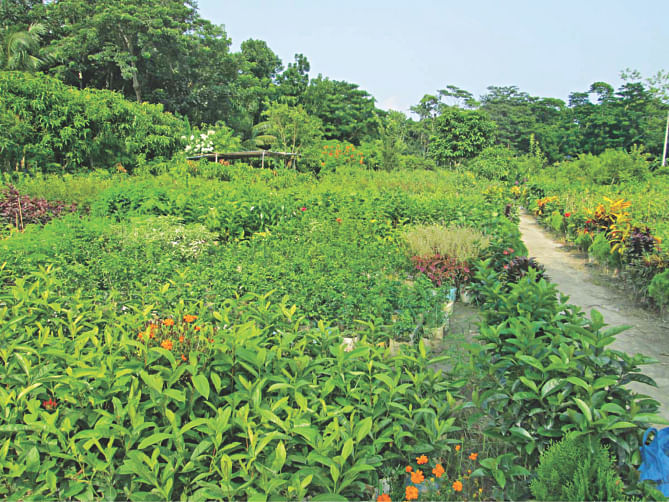Nursery trade creates thousands of jobs
Nursery trade creates thousands of jobs

Nursing of wooden, flower and medicine plants at Nesarabad upazila in Pirojpur has created job opportunities for thousands of men and women. In the upazila, nurseries are doing well at Jalabari, Shangal, Sarupkathi, Alankarkathi, Samudoykathi, Mahamudkathi, Guarekha and some other parts as well.
Most of the families living in the area are involved in the trade. Not a single inch of space at their houses and gardens are left empty. At first farmers sow seeds of plants in the soil. After they grow a few inches high, they are set in small mud pots known as tally. Plants slowly keep growing in their pots as they are sold in this stage. These nurseries are simply beautiful, and attract many people who come to simply admire the natural beauty of diverse plants even if they aren't specifically interested in buying anything. In average, farmers spend TK 4-5 for rearing a wooden tender plant and they sell it at TK 8-10 to wholesalers. According to change in variety of plants' species, the production costs change. Wholesalers sell these plants across the country, and Naserabad fulfills a large part of the country's demand for small plants.
All kinds of wooden plants, such as rain tree, mehagani, champal, akasmoni and so on are available at the nurseries at Nesarabad. Different species of flowering plants such as rose, tuberose, night queen and many other species are available here as well. Fruit bearing plants including strawberry, malta, lemon, guava, jack fruit, grape, apple can also be found.
Because of a large number of canals in the upazilas spread like a web, traders can transport plants easily to different parts of the country. “I have become solvent through nursery business and my cultivation area is increasing every year,” said Md Manik Miah, owner of Nesarabad Nursery adding that at least ten people are always at work at his five bigha nursery. It's not just adults, but young boys and girls as well who are getting involved in their free time since they can earn well through this profession. “During my break after school, I work at my father's nursery,” informed Rabbi, a student at a high school of Nesarabad municipality. “I help to grow plants in places around our house with my mother and I am happy being able to play a role in increasing our family income,” said Sumaiya, a school student of the area. Men and women work as equals in this profession, be it in sowing seeds or simply looking after them in the yard.
Wholesalers frequent the upazila buying plants which they then carry to the city to sell. “I usually buy wooden plants for TK 10 and I can sell them at TK 14-15 in Dhaka,” said Md. Firoj Khan, a wholesaler who has been doing this business for the last 15 years. There are eight people under Firoj's employ. Like him, many other wholesalers operate in the area. The buying and selling of flower plants run all year long. But sales of wooden plants are known to peak in the rainy season.
Unfortunately, with the rise in production costs, the profit margin of farmers has thinned. “Now we have to pay more to buy seeds and other materials than before and labour cost has also increased,” said Md Rafikul Islam, a nursery owner of Sarupkathi municipality in the upazila who has cultivated small plants on 2 bigha of land and has been involved with the trade for the last 35 years.
According to Nesarabad upazila agriculture office, 1,942 farmers are involved in nursing and they are cultivating plants over 485 hectors of land. “Job opportunity has been created for many educated but unemployed youth in the upazila through the nursery trade,” said Md. Shahidullah, Agriculture Officer of Nesarabad. He added that the agriculture department provides technical support to the farmers in many cases.